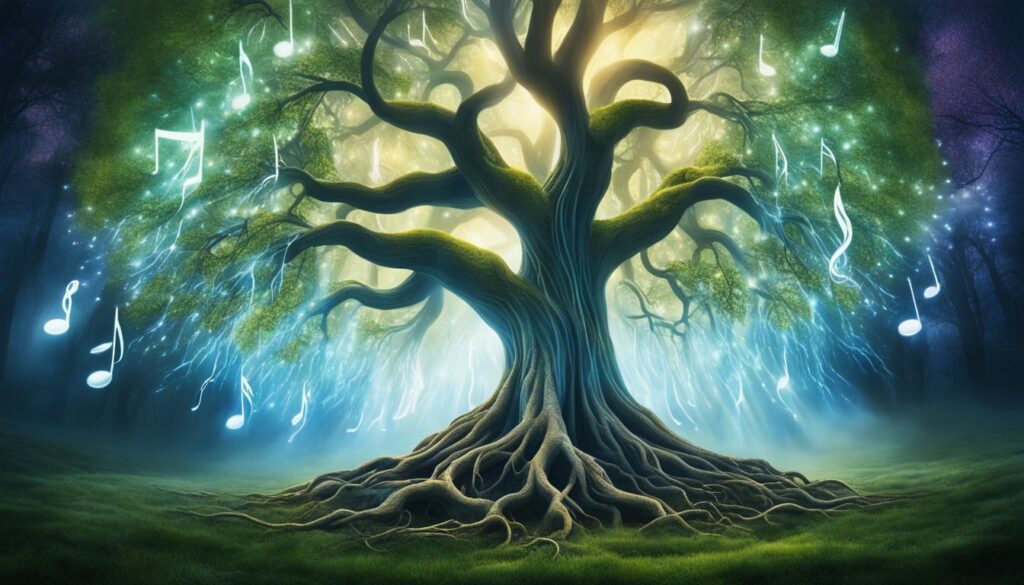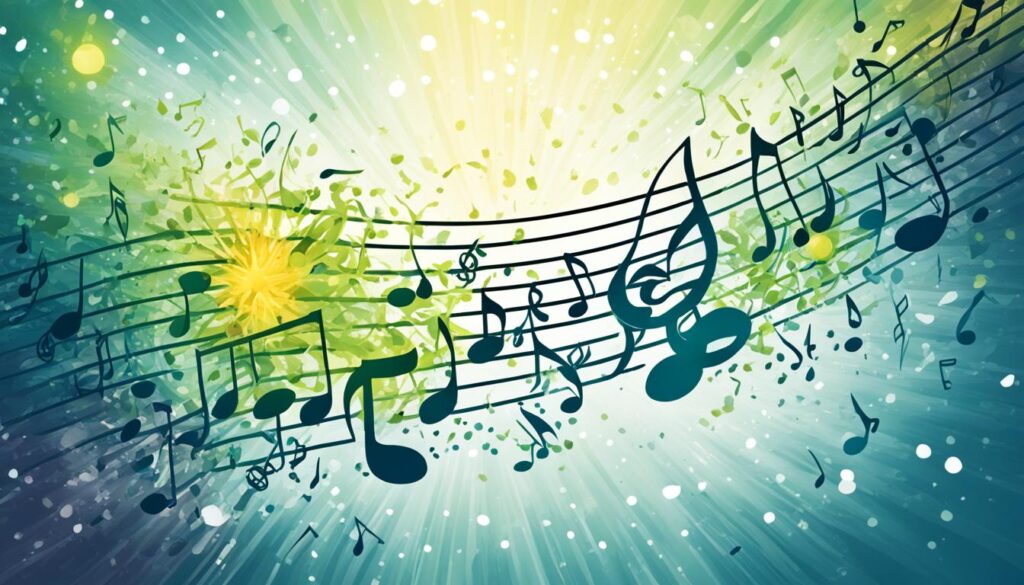Have you ever wondered why a certain song can make you feel a surge of joy or bring tears to your eyes? How does music have such a profound effect on our emotions? Discover the enchanting power of music and its influence on our mental health. Dive into the world of melodies and rhythms that have the ability to move us in ways we never thought possible.
Music is a universal language that speaks to our souls and transcends cultural barriers. It has the remarkable ability to tap into our emotions, bypassing our intellects and directly touching our hearts. Whether it’s a passionate love ballad, an upbeat dance track, or a hauntingly beautiful melody, music has the power to evoke a wide range of emotions and stir something deep within us.
But how exactly does music influence our emotions? How does it affect our mental well-being? Join us as we explore the intricate relationship between music and our emotional landscape. Prepare to be amazed by the profound impact music has on our minds, bodies, and spirits.
Key Takeaways:
- Music is a universal language that can evoke powerful emotions and transcend cultural boundaries.
- Music has a profound impact on our mental health and well-being.
- Listening to music can bypass our intellects and directly touch our emotions and spirits.
- Discover the fascinating connection between music and our emotional landscape.
- Explore the transformative power of music and its ability to move us in profound ways.
What is Magic in Music?
Music has a unique ability to captivate and enchant us, creating a sense of wonder and awe. This is the magic of music – an intangible quality that transcends language and cultural barriers. It transports us to different worlds, connecting us with others and revealing hidden aspects of ourselves.
As a universal language, music speaks directly to our souls, evoking powerful emotions and stirring our deepest thoughts and desires. It has the power to comfort, inspire, and heal. Whether we are facing challenges, struggling with trauma, or striving to achieve our goals, music can provide solace, strength, and guidance.
Just as wizards and sorcerers use spells and incantations to weave their magic, musicians use melodies, harmonies, and rhythms to cast a spell over their listeners. The enchantment in music lies in its ability to tap into our emotions, taking us on a journey of self-discovery and self-expression.
No matter who we are or where we come from, music has the power to touch our hearts and souls. It transcends boundaries and unites us in a shared human experience. It is a language that speaks directly to our emotions, allowing us to connect with others on a profound level.
So next time you listen to a piece of music that moves you, remember the magic that lies within it. Embrace the enchantment in music and let it take you on a journey of self-discovery and connection.
The Power of Music – Quotes
“Music is the strongest form of magic.” – Marilyn Manson
“Music is a piece of art that goes in the ears straight to the heart.” – Unknown
The Enchantment of Music – Songs
- “Bohemian Rhapsody” by Queen
- “Hotel California” by Eagles
- “Imagine” by John Lennon
- “Hallelujah” by Leonard Cohen
- “Stairway to Heaven” by Led Zeppelin
How Songs About Magic Influence Our Emotions and Beliefs
Songs about magic have a profound impact on our emotions and beliefs, captivating our imagination and inspiring a sense of wonder. They possess the power to transport us to fantastical realms and evoke a range of emotions. Through their enchanting melodies and evocative lyrics, these songs stimulate various regions of our brain associated with reward, pleasure, motivation, and memory.
Research has shown that music has the ability to modify our perception of neutral faces, enhancing positive moods and boosting creativity. When we listen to songs about magic, they ignite our curiosity and optimism, encouraging us to embrace the limitless possibilities of the world. These songs have the potential to challenge our assumptions, broaden our perspectives, and inspire us to pursue our dreams.
“Music is the language of the spirit. It opens the secret of life, bringing peace, abolishing strife.” – Kahlil Gibran
The Emotional Impact of Songs About Magic
Songs about magic can evoke a myriad of emotions within us. They can transport us to a place of joy, excitement, and awe, allowing us to momentarily escape the realities of life. These songs may also evoke a sense of nostalgia, reminding us of cherished memories or long-lost dreams.
Moreover, songs about magic can tap into our deepest emotions, enabling us to process difficult experiences, heal emotional wounds, and find solace. They can provide comfort during times of sadness or grief, and inspire hope in times of despair. The emotional impact of these songs is profound, offering us a cathartic release and a renewed sense of optimism.
The Influence of Songs About Magic on Beliefs
Songs about magic have the power to shape our beliefs and perspectives. Through their enchanting narratives and enchanting melodies, they can challenge our existing beliefs and encourage us to explore new ideas. These songs may provoke introspection, prompting us to question the nature of reality and our own place within it.
Furthermore, songs about magic can inspire us to embrace a sense of wonder and curiosity about the world. They can ignite our imagination and encourage us to think beyond the constraints of logic and reason. These songs remind us of the beauty and mystery that lies within the world, fostering a sense of awe and reverence for the unknown.
Ultimately, songs about magic have a profound impact on our emotions and beliefs. They evoke powerful emotions, stimulate our imagination, and challenge our assumptions. These songs serve as a reminder of the power of music to transcend boundaries and connect us to something greater than ourselves.

| Songs About Magic | Genre | Artist |
|---|---|---|
| Black Magic | Pop | Little Mix |
| Abracadabra | Rock | Steve Miller Band |
| Strange Magic | Rock | Electric Light Orchestra |
| Magical Mystery Tour | Rock | The Beatles |
| I Put a Spell on You | Soul | Nina Simone |
The Best Songs About Magic for Your Playlist
If you’re looking to add some enchantment to your music playlist, here are some of the best songs about magic that span across different genres and themes. These songs are not only catchy and fun, but also carry deep meanings and uplifting messages. So get ready to be spellbound by these magical tunes!
- “Every Little Thing She Does Is Magic” by The Police
- “Magic Carpet Ride” by Steppenwolf
- “I Put A Spell On You” by Nina Simone
- Your Choice
- Your Choice
These songs capture the essence of magic, with their captivating melodies and enchanting lyrics. “Every Little Thing She Does Is Magic” by The Police is a timeless classic that explores the mysterious power of love. Steppenwolf’s “Magic Carpet Ride” takes you on a psychedelic journey through the realm of imagination. And Nina Simone’s powerful rendition of “I Put A Spell On You” will leave you mesmerized.
Whether you prefer rock, jazz, or any other genre, these songs will add a touch of magic to your playlist and transport you to a world of wonder. So sit back, relax, and let the magic of music infuse your soul.
Unlock the Power of Music with Songs About Magic
Music has the ability to captivate our hearts and minds, and songs about magic take this enchantment to a whole new level. These songs not only entertain us but also evoke emotions, spark our imagination, and fill our lives with a magical charm. So whether you’re seeking inspiration, looking to uplift your spirits, or simply in need of a musical escape, songs about magic are the perfect addition to your playlist.
The Neuroscience of Music
Research in neuroscience has provided fascinating insights into how music impacts the human brain. When we listen to music, it sets off a series of complex reactions within our neural networks, influencing our emotions, memory, and reward systems. The intricate dance of neural connections that occurs while enjoying music is truly mesmerizing.
Music has the power to activate various neural regions associated with emotions, such as the amygdala, hippocampus, and prefrontal cortex. These regions play a crucial role in shaping our emotional experiences and deepening our connection with the music we hear. Furthermore, music stimulates the release of neurotransmitters like dopamine, creating feelings of pleasure, motivation, and euphoria.
The impact of music on our brain extends beyond the emotional realm. It can evoke vivid memories and associations, transporting us back in time to specific moments or experiences. This ability to trigger memories is particularly profound, as it taps into our autobiographical memory, allowing us to relive past events through the power of music.
Moreover, music has a profound effect on our overall well-being. Its ability to evoke deep emotions and enhance our mood has been well-documented. Whether it’s a powerful ballad that brings tears to our eyes or an energetic rhythm that uplifts our spirits, music has the power to transform our emotional state.
In addition to its emotional and psychological impact, music has been found to benefit various aspects of cognitive functioning. Research suggests that listening to music can improve attention, memory, and even problem-solving skills. This may be due to the activation of neural networks involved in cognitive processing and the synchronization of brain activity induced by rhythmic patterns in music.
Overall, the neuroscience of music reveals the intricate relationship between music and the human brain. It highlights how music can evoke powerful emotions, trigger memories, and enhance our overall well-being. Understanding these underlying mechanisms can enhance our appreciation for the magic of music and its profound impact on our lives.
The Therapeutic Benefits of Music
Music therapy has emerged as a powerful tool for addressing mental health conditions. Through the therapeutic use of sound, rhythm, and melody, music therapy provides a holistic approach to emotional healing and well-being.
Music therapy creates a safe and nurturing environment for emotional expression and exploration, fostering self-awareness and growth. It offers individuals a non-verbal and creative outlet to communicate and process their emotions, which can be especially beneficial for those who struggle with verbal expression.
Research has shown that music therapy can alleviate stress, anxiety, and depression. The soothing nature of music can help reduce physiological responses to stress, such as elevated heart rate and blood pressure, promoting relaxation and calmness.
The therapeutic benefits of music extend beyond emotional well-being. Music therapy stimulates the release of neurotransmitters like dopamine and endorphins, which are known to enhance mood and promote feelings of pleasure and happiness. It can also improve cognitive functions such as attention, focus, and memory.
Music therapy techniques vary depending on individual needs and goals. It may involve listening to music, playing musical instruments, singing, or engaging in improvisation. Trained music therapists tailor interventions to promote the desired therapeutic outcomes.
Overall, music therapy offers a unique and accessible approach to improving mental health. It harnesses the power of music to create a therapeutic and transformative experience, providing individuals with an alternative path to healing and self-discovery.
“Music therapy is a research-based practice and profession in which music is used to actively support people as they strive to improve their health, functioning, and well-being.”
Whether it’s through individual therapy sessions, group programs, or community-based initiatives, music therapy provides valuable support for individuals of all ages and backgrounds. Its positive impact on mental health makes it an essential component of holistic care.
The benefits of music therapy include:
- Reduced stress and anxiety
- Enhanced mood and emotional well-being
- Improved cognitive functions
- Increased self-awareness and self-expression
- Strengthened social connections and support
Music Therapy for Different Mental Health Conditions:
| Mental Health Condition | Therapeutic Goals | Music Therapy Interventions |
|---|---|---|
| Anxiety Disorders | Reduce anxiety, promote relaxation | Deep breathing exercises with calming music, progressive muscle relaxation to music |
| Depression | Enhance mood, foster self-expression | Lyric analysis through songwriting, creating personalized playlists |
| Post-Traumatic Stress Disorder (PTSD) | Manage trauma-related symptoms, promote emotional healing | Rhythmic drumming for grounding and addressing trauma-related triggers |
| Autism Spectrum Disorder | Promote social interaction, improve communication skills | Turn-taking activities with musical instruments, song-based social stories |

Music’s Influence on Productivity and Focus
Music can be a powerful tool in enhancing productivity and focus for individuals in various contexts. The right choice of music can create a conducive environment for improved concentration and efficiency. Whether you’re studying, working, or engaging in any task that requires focus, incorporating music into your routine can have a positive impact on cognitive performance.
Research suggests that different genres of music may be more suitable for different tasks. For activities that require deep concentration, such as reading or problem-solving, instrumental or ambient music without lyrics can be beneficial. The absence of lyrics prevents potential distractions, allowing you to maintain your focus on the task at hand.
On the other hand, if you need a boost of motivation and energy, choosing energetic or upbeat genres of music can help elevate your mood and provide a burst of inspiration. The rhythm and tempo of such music can stimulate physical and mental energy, making it ideal for tasks that require movement or creativity.
Music also acts as a mood influencer, which can be particularly useful in managing stress and regulating emotions during work. The right choice of music can help create a positive and calming atmosphere, reducing feelings of anxiety or overwhelm. This can lead to increased productivity and a greater sense of overall well-being.
“Music washes away from the soul the dust of everyday life.” – Berthold Auerbach
Incorporating music into your daily routine can have a transformative effect on your productivity and focus. By selecting the appropriate genre and considering your task’s requirements, you can leverage the power of music to enhance your cognitive performance and achieve optimal results.
Conclusion
The power of music to influence our emotions and mental health is undeniable. Music serves as a universal language that transcends boundaries, connecting people from different cultures and backgrounds. Whether it’s through the lyrics, melodies, or rhythms, music has the ability to evoke deep emotions and trigger memories, creating a profound impact on our overall well-being.
One of the remarkable ways music is utilized is in the field of music therapy. Extensive research has shown that music therapy can provide significant benefits in treating mental health conditions. By understanding the neuroscience of music, we can tap into its transformative potential and harness its healing effects. Music therapy creates a safe and nurturing environment for emotional expression, personal growth, and deeper connections.
Music has the power to heal, inspire, and uplift. It can soothe our souls, ignite our passions, and bring us together. Whether we are listening to our favorite songs, playing an instrument, or engaging in music-making with others, the influence of music on our emotions is profound. It is not just a form of entertainment, but a powerful tool for emotional healing, self-expression, and personal transformation.
In conclusion, as we continue to explore the magic and power of music, let us embrace its ability to move us, connect us, and heal us. Let us recognize the profound influence of music on our emotions and mental health, and harness its potential to create positive change in our lives. Through music, we can discover the depths of our emotions, find solace in challenging times, and experience the transformative power of the universal language that is music.



